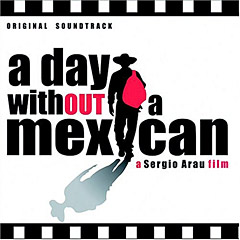 |
 |
 |
 Entertainment | October 2005 Entertainment | October 2005  
Students Contemplate 'A Day Without a Mexican'
 Vanessa D. Overbeck - redlandsdailyfacts.com Vanessa D. Overbeck - redlandsdailyfacts.com


| | What would happen if all the Mexicans suddenly, and without explanation, disappeared from California? |
What would happen if all the Mexicans suddenly, and without explanation, disappeared from California?

Sergio Arau and Yareli Arizmendi explore the answer to this question in the 2004 independent film "A Day Without A Mexican." The co-writers, director and star of the film were on hand at the University of Redlands' Convocation Series Fall 2005 Tuesday to share the story behind the making and release of the controversial film.

"A Day Without A Mexican" follows the lives of three families as they learn how to live without their loved ones, friends, servants, and workers after every person of Mexican descent inexplicably disappears from California. "There goes the neighborhood," as chaos, tragedy and comedy quickly ensue.

The idea started with a rare vacation in New York in 1994. Arau and Arizmendi were captivated by a yearly event held in the city called "A Day Without Art," which celebrates the contributions of artists who have died of AIDS.

"The atmosphere was thick with anti-Mexican, anti-immigrant sentiments in California with the Proposition 187 campaign spearheaded by Gov. Pete Wilson," Arizmendi said. "The idea was to drive out all the Latinos and get our Sunshine California back. And I said what California really needs is a day without a Mexican because we are everywhere and we are part of this state."

Arau and Arizmendi produced a short film that so captured the hearts and minds of audiences that major studios clamored to produce the feature length film. However, once the mainstream American studios saw what Arau characterized as a "political cartoon meets satirical docudrama," they backed out of the project.

A Mexican distribution company looking to expand its operations into the United Sates gladly accepted the challenge and "A Day Without A Mexican" was born.

Arau and Arizmendi wanted the film to be a dialogue opener and they started the discussion with a bang, posting billboards in the busiest commuter areas of Los Angeles. The signs read in bold black and red letters "On May 14th there will be no Mexicans in California."

They also flooded the L.A. streets with "missing" posters reading "Where's Jose?" and displaying a stereotypical image of a Mexican man wearing a sombrero.

In Latino neighborhoods the billboards read, "On May 14th those gringos are going to cry."

The buzz began immediately driving audiences to the theaters.

The critics did not like it, harping on its lack of genre specificity and technical expertise, Arau said, but audiences loved it. Opening weekend in the United States, "A Day Without A Mexican" was second at the box office behind "Troy." In Mexico, it was the year's No. 1 box office hit.

However, the filmmakers were accused of "fanning the fire," leaving Latinos to suffer the consequences.

"We are not fanning the fire, the fire is on and we have to figure out how to put it out for good," Arizmendi said.

In the film each character changes and evolves. No one is left untouched by the experience of losing 13 million Californians. Eventually, the Mexicans return to California, unaware they have been absent for any length of time. They are greeted warmly with welcoming embraces and cries of exultation from friends, family, employers and even the border patrol.

"How do you make the invisible, visible? ... You take it away," Arizmendi said.

Arau and Arizmendi said they were happy with how their film opened the issue and started the discussion in the state, the nation and the world. The film made national headlines and countries such as Italy and Germany are making their own versions of the film focusing on African and Turkish immigrants, respectively.

"Just like in the film with the plumber and the leaky faucet ... eventually, you have to get in there and fix the leak," Arizmendi said.

Email Vanessa D. Overbeck at voverbeck@redlandsdailyfacts.com | 
 | |
 |



